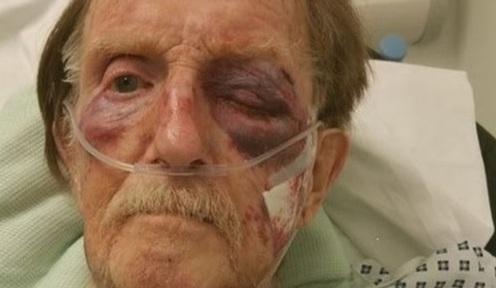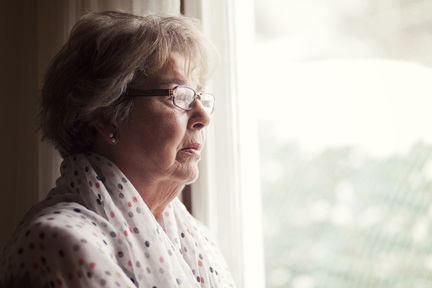Hostility to elderly under review as hate crime
A new review will consider whether ageism should be treated as a hate crime. 
The review by the Law Commission has been requested by the government to consider if there should be additional ‘protected characteristics’ such as 'age' attributed to hate crime legislation.
Hate crimes and incidents are defined as those perceived to be motivated by hostility or prejudice based on a personal characteristic. The government’s revised action plan on hate crimes was announced during Hate Crime Awareness week (13-20 October).
’Sickening behaviour'
Home secretary Sajid Javid said: “Hate crime goes directly against the long-standing British values of unity, tolerance and mutual respect – and I am committed to stamping this sickening behaviour out".
The government’s action plan includes over £1.5m of new funding for Hate Crime programmes that work with schools and young people to challenge discriminatory beliefs, promote positive discussions and encourage reporting.
Mr Javid added: "Our refreshed action plan sets out how we will tackle the root causes of prejudice” and he described a need to “support hate crime victims and ensure offenders face the full force of the law”.
One million victims of elder abuse a year
Hate crimes include verbal abuse, physical violence and offences against property such as arson. These are known as aggravated offences and can attract longer prison sentences than similar crimes not motivated by hate.
The Action on Elder Abuse charity estimates there are around one million victims of elder abuse each year in the UK including incidents in care homes and private homes involving physical, financial, psychological, sexual abuse or neglect.
Despite this, official figures reveal only around 0.3 per cent of this total results in a successful criminal conviction. (In 2016/17, there were just 2,856 successful convictions).
The charity believes making elder abuse a specific aggravated offence in statute would mean courts would be required to apply a mandatory sentencing uplift, as is already the case for crimes motivated by prejudice based on someone’s race, sexual orientation, religion or disability.

"A review of hate crime legislation must make abuse of older people an aggravated offence in law", the charity Action on Elder Abuse has said.
Gary FitzGerald, the charity’s chief executive, said: “it was time to give older victims of crime the same protections as other groups victimised for their personal characteristics”.
Elderly ‘neglected and abused’ in care homes and private homes
The charity describes elder abuse as “a widespread problem” that occurs across the UK in institutional care settings and private homes.
The charity believes elder abuse should be classified as an aggravated offence, similar to hate crimes, in order that courts are forced to impose tougher sentences and sent out more of a deterrent to offenders.
In a poll by the charity in 2017, 96 per cent of respondents backed calls for tougher penalties for crimes against older people. More than a third (34 per cent) assumed such crimes were already classified as an aggravated offence with 60 per cent believing they should be.
Mr FitzGerald said: “We welcome today’s announcement that a review into hate crime legislation will consider the need for elder abuse to become an aggravated offence. Frankly, such a step is long overdue”.
“Older people are being neglected and abused physically, financially, psychologically and sexually across the country every day, both in care settings and in their own homes.
“But the number of convictions for these crimes is tiny and, even when someone is found guilty, they often escape with flimsy sentences and paltry fines that do nothing to deter would-be abusers.”
He believes the UK has an opportunity to join other countries including the US, Japan and Israel by “making elder abuse a crime, with the sorts of punishments that the public expects”.
Battered and lying in a pool of blood
An 87-year-old man named Arthur 'Bob' Gumbley was found battered and lying in a pool of blood at his home in Sutton Coldfield last year.
In what was described as a ‘despicable’ and ‘cowardly’ crime, a spokesman for Staffordshire Police told homecare.co.uk, Mr Gumbley was left with “horrific injuries” after men broke into his home, robbed him of cash, kicked him and punched him in the face “while he lay defenceless on the floor”.
At the time, Detective Inspector John Quilty said: "This was a despicable and cowardly attack on a defenceless, elderly man in his own home. Mr Gumbley suffered terrible injuries and was understandably left very badly shaken.”
The charity's chief executive said: “We must make it clear that we as a society will not tolerate these cowardly acts against some of the most vulnerable people in our community.”

Scotland considers introducing elder abuse legislation
The government’s announcement follows a similar legal review in Scotland which reported its findings in May this year. In his report, Lord Bracadale presented recommendations for introducing new offences based on age hostility and perceived vulnerability.
The Scottish government’s justice minister, Humza Yousaf, has indicated that he is in favour of introducing legislation to tackle elder abuse.
The CPS details conviction rates for crimes against older people in its annual report on hate crime, but there is no statutory definition of a crime against an older person and no specific legislation.
Sections 145 and 146 of the Criminal Justice Act 2003, which provide for a sentencing uplift in cases of racist and religious crime, homophobic and transphobic crime and disability hate crime, do not specifically apply to crimes against an older person.
While the CPS does provide sentencing guidelines to courts which encourage tougher sentences in cases where the victim is old and infirm, the charity has highlighted that there is no monitoring of whether these guidelines actually get used.
The charity has stated: “We believe that it's still relatively common for people who commit crimes against older people to get off with a fine or suspended sentence rather than e.g. jail time.”
Latest News
 29-Jul-24
Dementia Bus gives carehome.co.uk staff insight into life with dementia
29-Jul-24
Dementia Bus gives carehome.co.uk staff insight into life with dementia
 01-Mar-24
Find out the top care homes in 2024
01-Mar-24
Find out the top care homes in 2024
 21-Mar-23
UK's top care homes in 2023 revealed
21-Mar-23
UK's top care homes in 2023 revealed
 03-Jan-23
carehome.co.uk launches free care helpline
03-Jan-23
carehome.co.uk launches free care helpline
 13-Dec-22
5 mins with Emily Whitehurst, chief operating officer for Constantia Healthcare
13-Dec-22
5 mins with Emily Whitehurst, chief operating officer for Constantia Healthcare